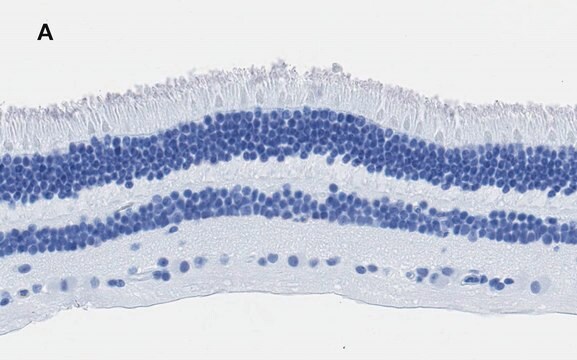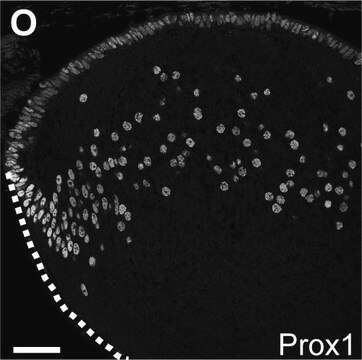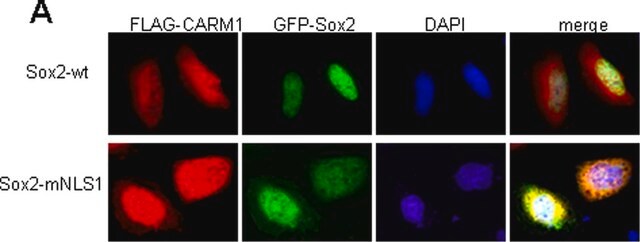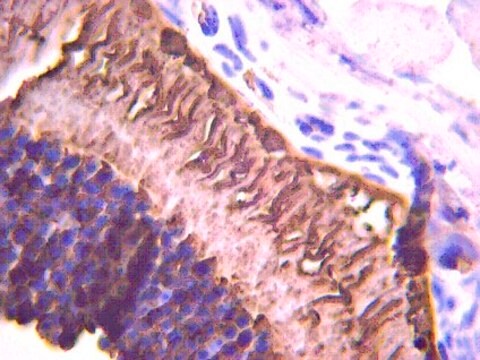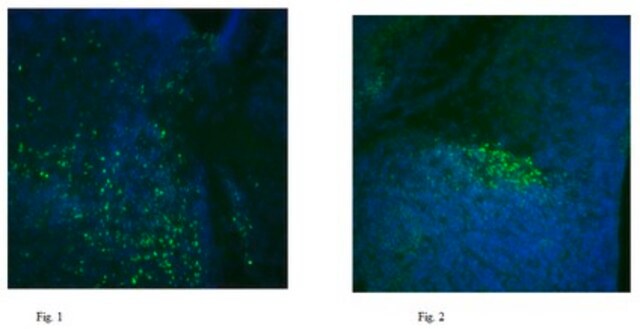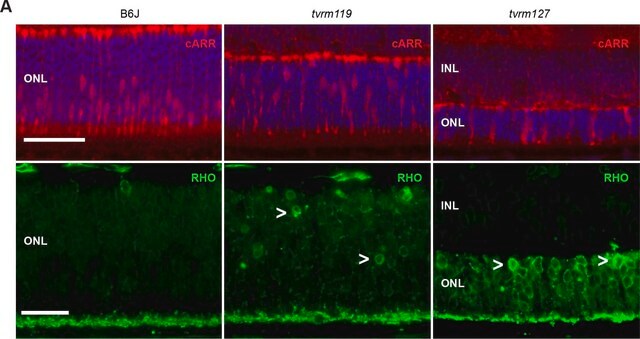おすすめの製品
由来生物
rabbit
抗体製品の状態
serum
抗体製品タイプ
primary antibodies
クローン
polyclonal
化学種の反応性
human, mouse, rat, frog, chicken
メーカー/製品名
Chemicon®
テクニック
immunocytochemistry: suitable
immunohistochemistry (formalin-fixed, paraffin-embedded sections): suitable
western blot: suitable
NCBIアクセッション番号
UniProtアクセッション番号
輸送温度
dry ice
ターゲットの翻訳後修飾
unmodified
遺伝子情報
human ... RCVRN(5957)
mouse ... Rcvrn(19674)
詳細
Recoverin is a calcium-binding protein expressed in retinal photoreceptors and midget cone bipolar cells. It appears to delay the termination of the phototransduction cascade by blocking the phosphorylation of photoexcited rhodopsin.
特異性
Other species have not been tested.
Recognizes recoverin.
免疫原
Recombinant human recoverin.
アプリケーション
Research Category
ニューロサイエンス
ニューロサイエンス
Research Sub Category
感覚・末梢神経
感覚・末梢神経
Detect Recoverin using this Anti-Recoverin Antibody validated for use in IC, IH, IH(P) & WB.
Western Blot Analysis:
1:1,000-1:5,000 dilution using ECL.
Immunohistochemistry:
1:1,000 (2 hours at room temperature or overnight at 2-8ºC) on frozen and paraffin embedded tissue sections. Suggested fixative is 4% paraformaldehyde or 3% paraformaldehyde with 0.1% glutaraldehyde. Suggested permeabilization solution is 0.1% Triton X-100. Suggested blocking buffer is 0.05 M Tris saline, pH 7.4 containing 2.5% BSA, 0.1% triton and 0.05% sodium azide.
Optimal working dilutions must be determined by the end user.
1:1,000-1:5,000 dilution using ECL.
Immunohistochemistry:
1:1,000 (2 hours at room temperature or overnight at 2-8ºC) on frozen and paraffin embedded tissue sections. Suggested fixative is 4% paraformaldehyde or 3% paraformaldehyde with 0.1% glutaraldehyde. Suggested permeabilization solution is 0.1% Triton X-100. Suggested blocking buffer is 0.05 M Tris saline, pH 7.4 containing 2.5% BSA, 0.1% triton and 0.05% sodium azide.
Optimal working dilutions must be determined by the end user.
ターゲットの説明
26 kDa
関連事項
Replaces: AB5431P
物理的形状
Unpurified
Rabbit polyclonal serum. Contains no preservative.
保管および安定性
Stable for 1 year at -20ºC from date of receipt.
アナリシスノート
Control
POSITIVE CONTROL: Recoverin is found in photoreceptors and midget cone bipolar cells in retina and pinealocytes in pineal gland.
POSITIVE CONTROL: Recoverin is found in photoreceptors and midget cone bipolar cells in retina and pinealocytes in pineal gland.
その他情報
Concentration: Please refer to the Certificate of Analysis for the lot-specific concentration.
法的情報
CHEMICON is a registered trademark of Merck KGaA, Darmstadt, Germany
免責事項
Unless otherwise stated in our catalog or other company documentation accompanying the product(s), our products are intended for research use only and are not to be used for any other purpose, which includes but is not limited to, unauthorized commercial uses, in vitro diagnostic uses, ex vivo or in vivo therapeutic uses or any type of consumption or application to humans or animals.
適切な製品が見つかりませんか。
製品選択ツール.をお試しください
保管分類コード
11 - Combustible Solids
WGK
WGK 1
引火点(°F)
Not applicable
引火点(℃)
Not applicable
適用法令
試験研究用途を考慮した関連法令を主に挙げております。化学物質以外については、一部の情報のみ提供しています。 製品を安全かつ合法的に使用することは、使用者の義務です。最新情報により修正される場合があります。WEBの反映には時間を要することがあるため、適宜SDSをご参照ください。
Jan Code
AB5585:
試験成績書(COA)
製品のロット番号・バッチ番号を入力して、試験成績書(COA) を検索できます。ロット番号・バッチ番号は、製品ラベルに「Lot」または「Batch」に続いて記載されています。
Genetic control of circuit function: Vsx1 and Irx5 transcription factors regulate contrast adaptation in the mouse retina.
Kerschensteiner, D; Liu, H; Cheng, CW; Demas, J; Cheng, SH; Hui, CC; Chow, RL; Wong, RO
The Journal of Neuroscience null
N Zabouri et al.
Neuroscience, 195, 145-165 (2011-08-27)
The endocannabinoid (eCB) system is thought to participate in developmental processes in the CNS. The rodent retina represents a valuable model to study CNS development because it contains well-identified cell types with established developmental timelines. The distribution of cannabinoid receptor
Adult donor rod photoreceptors integrate into the mature mouse retina.
Gust, J; Reh, TA
Investigative Ophthalmology & Visual Science null
Sonia Biswas et al.
PloS one, 9(6), e99075-e99075 (2014-06-12)
In the widely used mouse model of retinal degeneration, rd1, the loss of photoreceptors leads to rhythmic electrical activity of around 10-16 Hz in the remaining retinal network. Recent studies suggest that this oscillation is formed within the electrically coupled
J Cui et al.
Neuroscience, 224, 63-69 (2012-08-23)
Retinal bipolar cells and ganglion cells are known to possess voltage-gated T-type Ca(2+) channels. Previous electrophysiological recording studies suggested that there is differential expression of different T-type Ca(2+) channel α1 subunits among bipolar cells. The detailed expression patterns of the
ライフサイエンス、有機合成、材料科学、クロマトグラフィー、分析など、あらゆる分野の研究に経験のあるメンバーがおります。.
製品に関するお問い合わせはこちら(テクニカルサービス)

